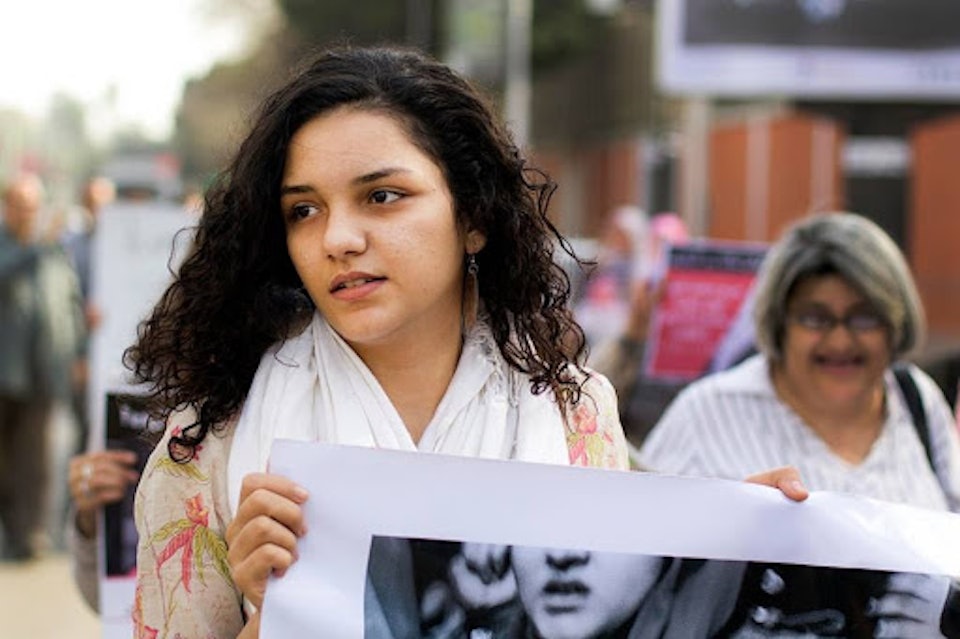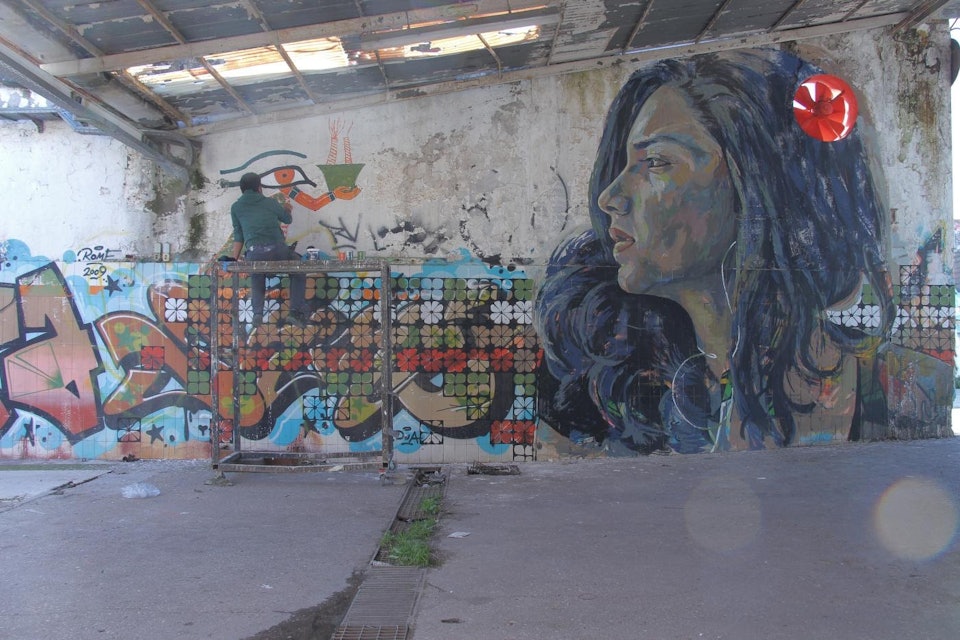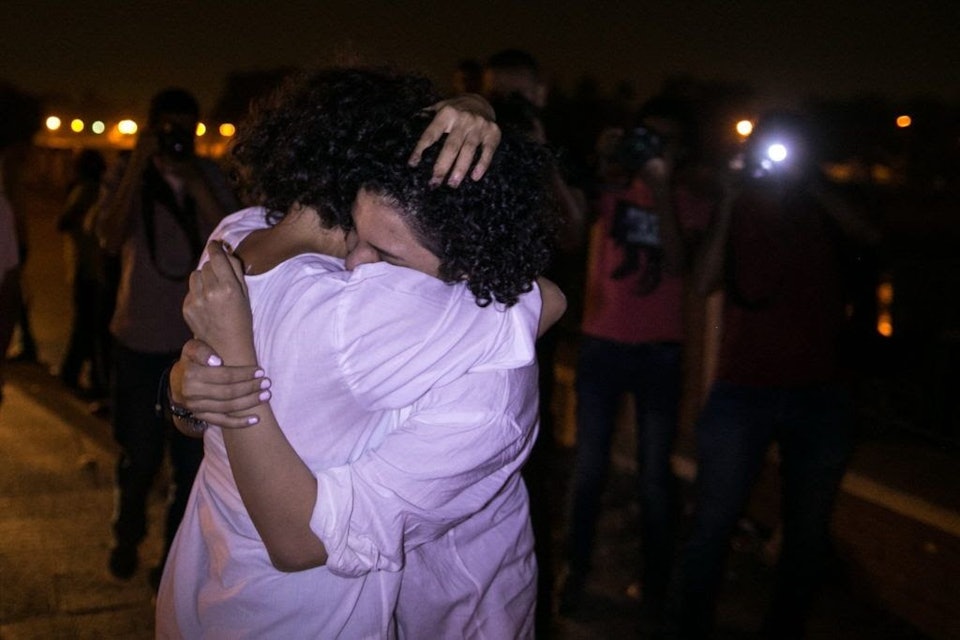Artist Profile
Sanaa Seif
Egypt
Status: Released

UPDATE: Seif was released in December of 2021. She had been convicted in March of that year on charges of “spreading false news,” “misusing social media,” and insulting a police officer on duty. Seif had completed her sentence of 18 months imprisonment, including time served.
“She belongs to what I call the pure revolutionary generation,” says muralist Ammar Abou Bakr about activist Sanaa Seif. “She is one of the best examples of a true Egyptian revolutionary.”
Sanaa Seif is not only an artist, but a symbol of strength in the activist community of Egypt. Born into a family of revolutionaries, Seif had always been politically engaged. In 2011, during the height of the Egyptian revolution, Seif found her own voice as an activist and her drive has been unceasing ever since. That year, 17-year old Seif attended her first major protest, an event protesting police brutality and honoring a young Egyptian man named Khaled Said who had been beaten to death by police in June 2010. From that point forward, Seif dedicated herself to advocating for social and political change.
Around this time, inspired by protests she attended in Tahrir Square, Seif launched an independent newspaper called “Al Gornal” (“The Newspaper”) in collaboration with some activist friends. The newspaper addressed activism, particularly focusing on the Arab Spring, and quickly gained mass attention. As interest grew, production swelled to over 30,000 printed copies per issue.

Seif’s work as a film editor has paralleled and converged with her activism, culminating in 2013, when the first major film Seif worked on, The Square, was released. The Square, which was critically acclaimed around the world, traces the cascade of revolutions that erupted in Egypt beginning in 2011 from the perspective of young activists involved in the anti-government protests. The film, “a saga filled with idealism, euphoria, disillusionment and danger,” won three Emmys and was nominated for the Academy Award for Best Documentary Feature at the 86th Academy Awards. However, as Seif’s artistic career flourished, so did the ruling authorities she sought to hold accountable through her work.
On June 21, 2014, Seif was targeted along with 22 other activists for protesting a draconian anti-protest law in Egypt that was introduced in 2013 to prevent demonstrations without government permission. Seif, along with the other activists, faced charges ranging from violating the protest law to use of violent weapons, despite lack of evidence supporting these accusations. All of the arrested protestors were sentenced to two years in prison and a further two years of government surveillance, along with a fine of more than 10,000 Egyptian pounds. Numerous human rights organizations and political movements denounced the sentencing, including a joint statement from the African Commission on Human and Peoples' Rights condemning the verdict. Sanaa was eventually released after serving six months in prison.

Despite the trauma of her unjustified arrest and imprisonment, Seif refused to be silent and continued expressing her political beliefs through her film work. Following her work on The Square, Seif worked on a collection of films including In the Last Days of the City (2016), Kiss Me Not (2017), About Her (2020), and Daughters of Abdul-Rahman (2020). As she persisted in her artistic endeavors, so too did Egyptian authorities’ campaign of harassment and intimidation. Seif’s brother, Alaa Abd El Fattah, a prominent activist, blogger, and software developer, was detained in September of 2019 during his five year probation period following a previous arrest. To this day, Abd El Fattah is being held in Tora prison in an information blackout, and has no way of communicating with the outside world.
Desperate to communicate with their loved one, Seif and her family visited Tora prison on June 22, 2020, insisting on their legal right to receive a letter from Abd El Fattah. The following morning, Seif and her family were attacked outside the prison by a group of women who allegedly took instruction from police officers and prison guards. They were severely beaten and had possessions stolen during the attack. The following day, on her way to report the incident, Seif was abducted by plainclothes policemen in front of the Public Prosecutor’s Office. Later that day, Seif was taken to Egypt’s Supreme State Security Prosecution, where she was questioned and detained based on pending charges of “spreading false news,” “inciting terrorist crimes,” and the “misuse of social media.”

Seif remains behind bars in pre-trial detention to this day, despite obviously fallacious charges and the imminent danger that she faces as COVID-19 runs rampant in Egyptian prisons. Pre-trial detention is regularly exploited to allow Egyptian authorities to hold detainees for years in jail without ever charging them or bringing them to trial. Seif’s brother, Abd El Fattah, is also currently in pre-trial detention and earlier this year, filmmaker and director Shady Habash––a close friend of Seif’s––died in custody after being held in pre-trial detention for over 800 days.
Though Seif’s voice is muffled behind bars, community outcries for her release have been unrelenting. This August, over 200 of the world's most prominent artists, along with nearly two dozen human rights groups and film organizations, signed a joint statement calling for her immediate release. ARC emphatically joins this call for Seif’s freedom, finding solace in the certainty that Seif, who has faced and overcome risk before, will emerge from this undaunted and ever-committed to using her artwork and activism to fight for a better world.

By Piper Morrison, November 2020. Piper is currently pursuing a B.A. at Oberlin College, concentrating on American Studies and Arts Management.